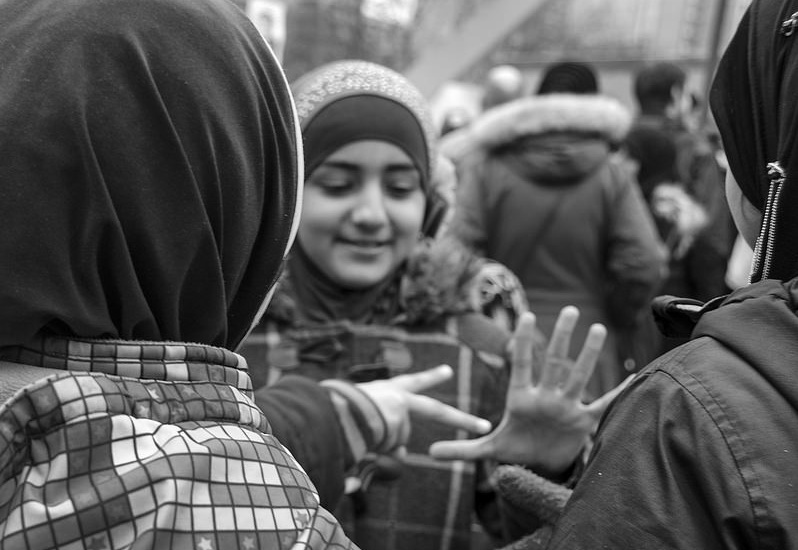SANTA BARBARA, Calif. (AhlulBayt News Agency) - By: Fareen Ali
When Dalilah Dris was in middle school, a boy asked her if she was sad that her uncle died. She was confused until the boy explained he was referring to Osama bin Laden.
That wasn’t the last time Dris dealt with Islamophobia. A few years later, another classmate asked if it was OK to crack terrorist jokes around her. Dris replied, “Do whatever you think is right.”
Dris, now 15, doesn’t wear identifiable religious clothing, yet still has to deal with negative comments regarding being Muslim. She said she reacts calmly “because if I acted angrily, I would’ve just gotten a worse reputation.”
The reputation Dris is referring to isn’t her own personal character, it’s the stereotypes some have of Muslims being violent. This is just one of the negative depictions that feed into Islamophobia and its consequences, issues that have been more in the national spotlight after the recent election cycle.
In December 2015 alone there were 53 anti-Muslim attacks across the country, in contrast to only two attacks nine months prior, according to a study by Georgetown University. Attacks can be verbal or physical and also include vandalism, arson and murder. Stories of some of these attacks have made headlines, such as those of Muslim women and their children being assaulted in New York, several Muslim Americans who were killed this year in the U.S. and Europe and a pregnant Muslim woman who was attacked in Barcelona, Spain.
While the victims in these instances were easily identifiable as Muslims because of religious attire, Islamophobia also affects teen girls who are not visibly Muslim or Middle Eastern. Sara Kyle, for example, recently received Instagram messages from someone she didn’t really know that said “Muslims are a problem. They believe in killing innocent people who don’t believe in Islam,” in addition to other offensive things concerning Islam. Kyle, who is 17 and lives in Paris, is of Lebanese descent and doesn’t wear religious clothing. She ignored the messages, saying that people hiding behind screens don’t deserve her responses.
Broader Attack
Even when Islamophobia isn’t directed at a specific person, it can feel like an attack. Merzia Subhan, 17, found hate comments in response to YouTube videos on Islam.
“Some of it was like ‘Muslims are animals,’” she said, recalling the online commentary from her home in Southern California. If she had seen these comments last year, Subhan would have responded to try and counter the ignorance. But now she doesn’t respond as much.
“It used to bother me more, in the beginning, like I’d spend almost an hour arguing until I gradually realized that people are going to be ignorant no matter what and nothing, especially a comment made on YouTube, is going to change their mind,” she said.
Subhan is a 17-year-old Pakistani American with tan skin and brown eyes. She doesn’t wear clothes that identify her as Muslim. “If I were visibly Muslim, people might say racist stuff to me,” she said. Even though people assume she is Indian or Hindu, she still feels the sting of attacks on Islam.
The toll of dealing with haters can be emotionally draining and exhausting for the young women. “It is just mainly frustrating because every time you argue it just takes more out of you,” Subhan said.
Current Political Rhetoric
The current political rhetoric has empowered some people who were not outwardly racist before to be more blatant about Islamophobia, said Blair Imani in a phone interview. Imani is a community activist for Muslim communities and the executive director of Equality for HER, a nonprofit organization in Washington, D.C., that raises awareness about issues that concern females globally.
Islamophobia “affects all Muslims,” said Imani. “Before I started veiling I realized that people thought I was not Muslim and then felt comfortable saying Islamophobic things around me, which hurt me just as much as when it is directed at me as someone who is visibly Muslim,” she said.
When it comes to encountering or witnessing Islamophobia, Imani said it’s important to “remember what happens, catalogue what happens.” She also pointed out that social media is a great tool to help spread the word about Islamophobia, bringing up how hundreds of people tweeted to American Airlines about discrimination against Muslims, for instance.
Aisha Osman, 15, has definitely catalogued her personal experiences with Islamophobia. Osman is Somali American and told Teen Voices about being called names like “terrorist” and “Somali pirate” by classmates. Osman, who wears a hijab, took action by writing a letter to President Barack Obama, which eventually led to a meeting with the president.
“It’s better to take action when one is confronted with Islamophobia or any kind of racism,” she said.
While Osman may be more religiously identifiable than the other teens interviewed for this story, she recognizes that Islamophobia is a struggle for all. Writing the letter to the president was a form of action.
“I felt all the negative emotions release from my body and I was happy,” Osman said.
/129
source : Womens Enews
Monday
5 December 2016
10:29:14 AM
796145

When Dalilah Dris was in middle school, a boy asked her if she was sad that her uncle died. She was confused until the boy explained he was referring to Osama bin Laden.
